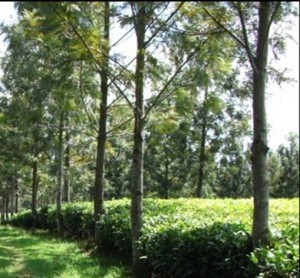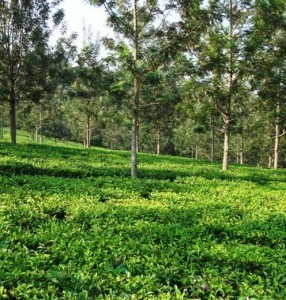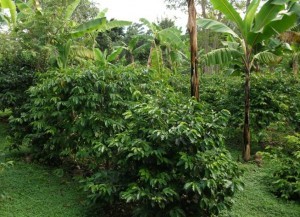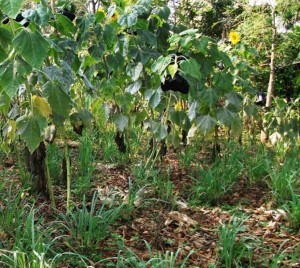Certified Organic Tea Arabica Coffee Oil Crops
Certified Organic Tea
Tea is the principle crop and Kahangi Estate is proud of its history as one of the pioneers of tea production in the region. The original 65 acres of tea were planted by Wilmot Barrett, (son in law of the owner Countess Stead) in 1935. The Estate has subsequently added an additional 30 acres of tea since 2001 and is still expanding the plantation.
The planting material for the tea is normally produced from cuttings and takes five to six years to come into production. The tea would normally grow into a tree but is forced to bush by regular formation pruning. This forces the tree to form extensive lateral grow which develops the plucking table.
The tea plantation is completely organically managed and no chemical inputs are used for fertilisation or weed control. The tea is manually weeded, removing or cutting high growing weeds, while weeds below the tea plucking table are left to form a cover to prevent soil erosion and enhance soil fertility. Fertilisation for the tea is assisted by using seed cake from the oil processing at the farm. This is typically applied once every two years at a rate of approximately 1 ton per acre.
Shade has been reintroduced into the old tea plantations and included in the planting of the new plantations. The shade is provided by Grevillea trees in the dry seasons preventing the tea from drying. The shade trees control water loss during all seasons and recycle nutrients which have leached deep into the soil. The trees regulate the growth of the tea and give good all year quality production.
The tea is hand plucked by a team of experienced male and female pluckers. They select and pluck only the young growing tip and two leaves. The tea from the new fields is used for the production of Green Tea at the Estate while the leaf from the older parts of the plantation are sold to a nearby factory for production into black tea.
Arabica Coffee
Arabica coffee was one of the first crops planted at the Estate in 1916, but following the collapse in coffee prices in the early 1930s the coffee was replaced with tea and phased out completely in the 1950s. In 2002 the Estate made the first trials re introducing coffee. Coffee is now established on 22 acres and expansion is on-going. The shade canopy is provided by bananas and a wide variety of shade trees both indigenous and introduced.
The coffee is completely organically managed.. The weeds are controlled by regular slashing, which provides good soil cover preventing erosion and enhancing natural fertility. Fertilisation of the coffee is provided by the recycling of coffee waste from the pulpery as well as ash from the processing of essential oils.
The trees are pruned to promote lateral grow and better cherry size. There are normally two coffee harvesting seasons, the first takes place from March to May while the second and normally larger harvest, takes place from August to December. The coffee is harvested and delivered to the pulpery situated in the centre of the estate. The coffee harvested in the morning, is pulped in the afternoon. The wet coffee beans are hand-picked and then are fermented for one night. The following day the coffee is washed and the mucilage removed. The coffee is sun dried for two to three weeks before being stored. The coffee is roasted in small batches as required, which ensures that the roasted coffee produced by the farm is always fresh.
Oil Crops
The Kahangi Estate variety of oil crops includes Avocado, Lemon Grass, Sunflower, Rosemary, Citronella and Eucalyptus
Avocado trees are intercropped with the coffee trees. The fruits of the avocado trees are , harvested and processed into oil at the farm. Residues and waste form the processing are recycled back onto the coffee fields.
Lemon grass is intercropped with sunflower and covers 5 acres of the farm. The combination of sunflower and lemon grass is an example of stacking crops, where the lemon grass provides ground cover and prevents erosion of the soil from the growing sunflower. The crops are fertilised by the recycling the remains of the lemongrass after distillation, along with seed cake from the processing of the sunflower oil. Two crops of sunflower are grown each season and the lemon grass is harvested approximately 6 times a year.
Rosemary and Citronella are grown in single stands covering 2 acres of land. Eucalyptus Citradora is grown in scattered locations around the estate where it has been established to provide wind breaks. The oil is extracted from the leaves of the tree.
See also sustainable land management practices and sustainable farming at Kahangi Estate.




